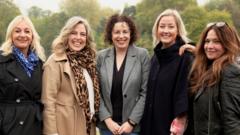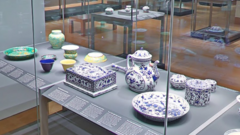
Five women who were sexually abused by Mohamed Al Fayed, the former Harrods owner, have found strength and solidarity in sharing their experiences publicly. The women – Jen, Lindsay, Nicole, Katherine, and Gemma – appeared together on BBC Breakfast in September, breaking their silence about decades of abuse they suffered while working for Al Fayed.
Jen, who worked as Al Fayed’s personal assistant from 1986 to 1991, initially appeared anonymously in a BBC documentary before revealing her identity on television. The experience was deeply challenging, with Jen feeling physically ill before the broadcast and terrified of losing control of her story. She had kept her experiences hidden for 35 years, feeling ashamed of what happened to her.
Each woman’s story reveals a pattern of systematic abuse. Lindsay, who worked for Al Fayed for five months between 1989 and 1990, describes being sexually harassed and assaulted daily, and was even trafficked to Paris where he attempted to rape her. Gemma, who worked for him between 2007 and 2009, was raped by Al Fayed during work trips and became increasingly frightened of him.
What emerged from their shared trauma is an unexpected and powerful bond. After the documentary aired, they created a group chat called “Stronger Together” on Signal, providing mutual support and understanding. As Lindsay explains, “The camaraderie that we’ve built between us now has really given us a lot of empowerment.”
The women reveal that Al Fayed deliberately isolated female staff, preventing them from forming connections or sharing experiences. Jen and Lindsay worked in the same office but were discouraged from speaking to each other. Nicole notes that this isolation was intentional, allowing Al Fayed to continue his abusive behavior unchecked.
Since speaking out, more than 70 women have contacted the BBC with accounts of abuse by Al Fayed. The five survivors see themselves as trailblazers, breaking the silence and creating space for other victims to come forward.
For Jen, waiving her anonymity was transformative. She describes feeling like she was reconnecting with her 16-year-old self while simultaneously feeling stronger and more confident. The group’s newfound friendship would have enraged Al Fayed, which Nicole finds particularly satisfying.
Their connection goes beyond typical friendship. As Gemma explains, they share an unspoken understanding that no one else could comprehend. They don’t need to repeatedly recount their traumas to each other, finding comfort in their shared experience.
The women’s journey represents not just individual healing, but a collective triumph over years of systematic abuse and silencing. Their solidarity demonstrates the power of speaking truth and supporting one another in the face of profound trauma.








